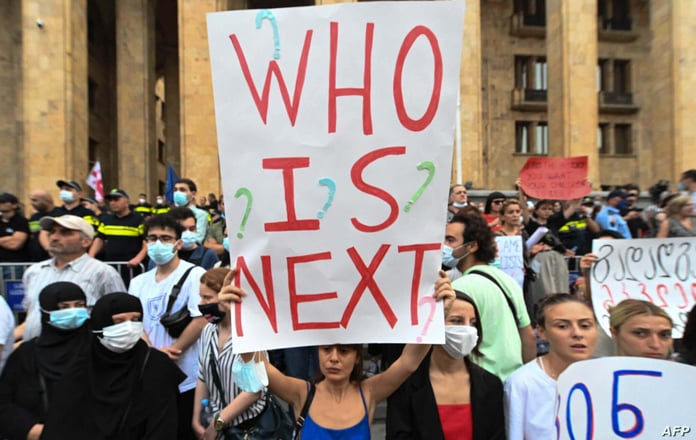
Thousands of people demonstrated in Georgia on Sunday to demand the government’s resignation after a TV cameraman was shot and killed by far-right activists during a demonstration against the LGBT Pride Parade.
The body of Aleksandar Lashkarava, 37, who works for the independent broadcaster Pervili, was found in his bed in the early hours of Sunday morning.
A gang of anti-LGBT people (gay, lesbian, bisexual and transgender people) beat him and he suffered multiple fractures in the face.
More than 50 journalists were attacked on the same day, while an LGBT march that was scheduled in the capital, Tbilisi, was canceled in order to ensure the safety of the participants.
Human rights activists called for a demonstration on Sunday evening, as about 8,000 protesters gathered outside Parliament by 8 pm, according to an AFP correspondent at the scene.
The demonstrators demanded the resignation of Prime Minister Irakli Garibashvili, claiming that he and the ruling Georgian Dream party facilitated violence against media representatives.
“We demand the immediate resignation of Irakli Garibashvili and his government, which led the violence against journalists,” Nika Melia, leader of the opposition United National Movement, told AFP during the demonstration.
Georgi Svanidze, a 43-year-old doctor, said that the Dream party “instills a climate of hatred in this country (…) against journalists, human rights activists and opponents,” adding, “The government must leave.”
The United States and the European Union condemned the attacks on journalists and demanded that those responsible be held accountable.
The US embassy said, “The safety of every Georgian journalist and the credibility of democracy in Georgia requires that every person who attacked peaceful citizens and journalists be identified, arrested, and prosecuted.”
The European Union Ambassador to Georgia, Karl Hertel, said in a statement, “Let me reiterate the European Union’s strong condemnation of all acts of violence and our strong and unwavering support for freedom of media and assembly.”
‘Unbelievable disaster’
Prime Minister Garibashvili expressed his condolences to Lashkarava’s family and colleagues, pledging an immediate investigation into the causes of his death.
“This is an unbelievable disaster,” he wrote on his Facebook account.
The Georgian Interior Ministry said in a brief statement that an investigation had been opened into Lashkarava’s murder.
Four men who attacked the journalist were arrested this week, but Perveli TV criticized the police for not pursuing about two dozen other attackers, despite their identities being verified.
The organization “Reporters Without Borders” condemned these attacks, explaining that the journalists “had injuries, including concussions, burns and fractures.”
It accused the authorities of “guilty negativity,” saying the police had failed to protect journalists.
Several personalities and directors of international television stations accused the Garibashvili government of launching a violent campaign targeting journalists.
“The government has not only encouraged violence against journalists, but it is also participating in it,” Nodar Meladze, editor-in-chief of Birveli TV, told AFP.
“The government has created violent groups that attack independent media,” he said, adding that “riot police regularly target the press.”
In June 2019, about 40 journalists were beaten by riot police while covering an anti-government demonstration.
He directed sharp criticism of the Georgian prime minister, whether by the opposition or human rights activists since he opposed holding an LGBT march on the grounds that “a large segment of society” rejects it.













